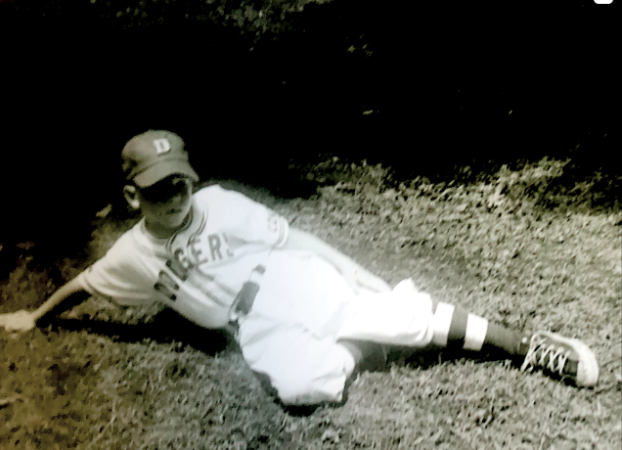
Playing Baseball in Japan
by Michael Ledwith
March 17, 2023
We lived in Japan from 1956-1959.
On a mile square former Japanese Army Post, taken over by the Americans after the war. Our maid survived the Nagasaki atomic bomb because there was a hill between her farmhouse and Ground Zero.
I drank my first root beer float at the Camp Fuchinobe Post Exchange.
Went to Tokyo a couple of times, saw the Imperial Palace. Kamakura to see the gigantic Buddha. Climbed Mt. Fuji.
There were beautiful cherry blossoms on post in the spring.
It is where I started playing Little League.
I was a third baseman and pitcher for the Sagamihara Dodgers. We played other Army camps, Air Force bases, and the dependent children’s team from the Yokosuka Navy Base.
My dad was an umpire and I can hear his voice as I type this saying from behind me when I was at bat: swing, Goddamit!
Swing!
I was selected for the All Occupation Forces Little League All Star team my second year.
Baseball was the most popular sport in Japan.
Of course, there was Sumo Wrestling. The only thing broadcast other than news on the single television station in Japan. My brother and I practiced the entire sumo ceremony, the grunting and groaning, the squat with fists on our thighs, the stamping and staring, throwing rice in front of us, my sister clacking wooden hangers together like the Shinto priest presiding because they were scared we were turning Japanese.
We also endlessly practiced ritual Samurai sword fighting with special bamboo swords.
The Army maintained an extensive ‘learn about Japan’ program for dependents all around Japan.
We attended Samurai school every month. We learned Judo. We visited silk worm factories to watch the process from larva to silkworm to cocoon to unraveling the silk and spinning it on spindles.
We spent a summer’s day watching bare breasted young Japanese women diving for pearls in a harbor not far from Camp Fuchinobe.
I never forgot it.
In return, Japanese kids our age came to the school to learn to dribble a basketball, kick a football, and ballroom dance.
They knew how to play baseball. It was their passion.
The rules were the same but they played with a slightly smaller, rubber coated ball.
The boys were much smaller than us, and the pitchers threw curve balls. We were not allowed to throw curveballs. We were told throwing them would ruin our arms.
The Occupation Forces All Star team was invited to play the Japanese Little League All Star team in Tokyo.
It was the height of the Cold War and the game was to be proof of the strong ties between Japan and America just ten years after the war.
It was a very big deal.
The biggest crowd we had ever played in front of had been thirty parents and American soldiers from the post teams we were batboys for.
Being a batboy was cool.
The soldiers on the team would chip in and buy the batboys silk warmup jackets with the team name and logo on the back. Your name on the front. An American flag on the sleeve.
We wore them everywhere and mine fell to pieces within a year of being stateside.
There’s a photo that I remember of Greg and I posing our jackets, the sun glinting off the silk arms.
Gone with the wind.
We stayed in a hotel in Tokyo. A very fancy hotel and we got to order room service as my mom and dad went dancing in the hotel ballroom. They came back to the room, stumbling and giggling and woke us all up.
We thought something was wrong, we had never seen our parents like that.
The stadium, my mom said, was like Ebbets Field. The field perfect. Perfectly manicured grass. Freshly chalked foul lines and batter’s boxes. Dugouts, not just benches behind a fence.
Not thirty parents and ten GIs we knew, but twenty thousand Japanese in the stands.
A formal beginning with speeches, team handshakes (the Japanese kids bowed).
We shook hands, and looked each one in the eyes.
One of our coaches, a Pacific War veteran, refused to participate in the greetings or ceremony.
No Japanese national anthem at all.
The Star-Spangled Banner and I felt a strange new feeling. I didn’t really know how to cuss, except from hearing my Ocilla uncles, but remember thinking, _ _ _ _ ‘em.
Of the game, I remember little.
Except that I hit a home run.
No not that kind. Not over the wall in right (I threw right handed and batted left) 325’ away, but a hard grounder down the line. A grounder hit hard enough that it ran all the way to the wall.
I could have made around the bases twice by the time the Japanese kid caught up with it and relayed it back in.
My coach, who I didn’t know, asked the umpire, through an interpreter, if he could have the ball for the ‘kid’ to have. The ump couldn’t understand even the concept and baseballs were expensive in postwar Tokyo, so no autographed baseball on the mantle.
No trophy either. Or glove. Or bat. Or jersey.
Ours was an Army family. We moved frequently. Nothing was saved from post to post.
Even our furniture was loaned to us by the Army on the day we moved in to our ‘quarters’.
I asked my mom about it once. She said that they did try to save things, but other than what was in a suitcase that you carried by hand, shipping anything was frowned upon and things ‘disappeared’.
I wish I had a Sagamihara Dodgers baseball cap, though.
Or a bamboo Samurai sword.
-30-
 Frequent contributor Michael Ledwith is a former bag boy at Winn-Dixie, who worked on the Apollo Program one summer in college. A former U.S. Army officer, he ran with the bulls in Pamplona and saw Baryshnikov dance ’Giselle’ at the Auditorium Theater. Surfer. Rock and roll radio in Chicago. Shareholder, Christopher’s American Grill, London. Father. Movie lover—favorite dialogue: “I say he never loved the emperor.”
Frequent contributor Michael Ledwith is a former bag boy at Winn-Dixie, who worked on the Apollo Program one summer in college. A former U.S. Army officer, he ran with the bulls in Pamplona and saw Baryshnikov dance ’Giselle’ at the Auditorium Theater. Surfer. Rock and roll radio in Chicago. Shareholder, Christopher’s American Grill, London. Father. Movie lover—favorite dialogue: “I say he never loved the emperor.”


Comments 5
Wonderful recollections.
My father, who is still alive and kicking at 92, was stationed in Japan a few years earlier than Michael, as a cryptographer during the Korean war. He has shared some fond memories, and I’ll share one here. Dad and his war buddies often frequented the various local tea markets. They would enjoy trying the countless types of orange, red, and green teas that the Japanese were fond of. Each GI had his own preferences and they often disagreed. One day after a “tea tour” the guys stopped in a local restaurant to treat themselves to dinner. Tea was served of course, but this time it was unanimous: the tea was the very best they had tried in Japan. They asked the Japanese waiter what kind it was. After retreating briefly to the kitchen, the waiter returned, bowed, and said in a distinct Japanese accent, “Lipton.”
I enjoyed reading this article. During my childhood a much-loved friend family friend was from Japan. Today, two of my grandchildren are Japanese-American. Baseball is still a much loved sport in Tokyo. The other thing they value is education, especially in mathematics. Hmm, perhaps there is a correlation to the two with all those angles, averages, and percentages.
Thank you. Beautifully written. Spent 15 months in South Korea, 1971, 1972. ROTC guy. Caught a G.I. game or two near Tokyo when we went over there for a break.
Great story. Sorry you don’t have souvenirs but at least you have your Little League photo.
Your picture reminds me of my brothers and their friends’ in their Little League uniforms.
Michael, that was beautiful read this Sunday morning. Thank you!!!